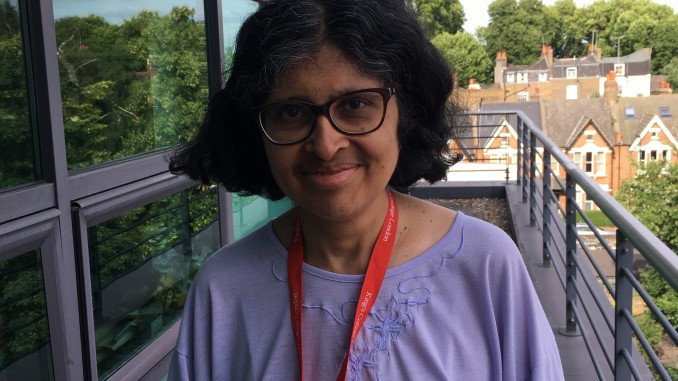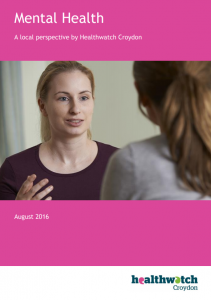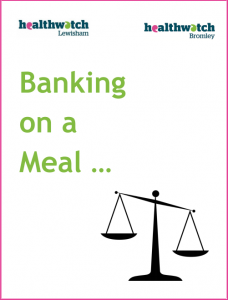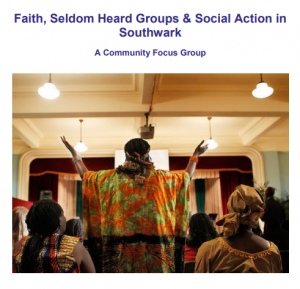
Savitri Hensman is the patient and public involvement coordinator at CLAHRC South London.
A quarter-century ago, while working as an outreach worker for a community organisation based in nearby Peckham, I heard plentiful accounts of mental and physical health problems, discrimination and other hardship. But I do not recall people telling me that they had been relocated far away in the midst of treatment or deprived even of the bus fare needed to attend appointments, stories that are all too common today.
For many in south London now, mere survival represents a challenge, making it harder to focus on and practice health-improving behaviours. Promising interventions can be undermined by combinations of multimorbidity, economic and social disadvantage and systemic weaknesses.
My work as patient and public involvement coordinator within the CLAHRC’s PPI theme brings me into contact not only with researchers, service users and members of the public already involved in the CLAHRC, but also a wider range of patient, carer and community organisations. I have examined reports from such organisations produced from April 2015 to March 2017, to see what light these might shed on the complex factors which can cause, intensify or alleviate suffering among local people, and help or hinder utilisation of research-based knowledge (read my full report here). Studying their findings may be especially valuable in research priority-setting.
Wide variation and the challenges of inequalities
Many reports focused on mental health, an evident concern within local communities. In general, they painted a mixed picture on the quality of information, services and opportunities. While many health professionals were committed, access to specialist services was variable and delays common.
For example, Mental Health: A local perspective, by Healthwatch Croydon, was based on engaging with 90 local adults (including carers and family members) and an additional 654 items of feedback on a database; emerging themes were ‘road-tested’ with a service user group. One service user described how: ‘all the care I have received when I get it has been great. Unfortunately, the delays in receiving this help have been very dangerous.’ In other boroughs too, local Healthwatch staff and volunteers are at work seeking to identify and improve health and social care service users’ experiences.
People experiencing poor or inconsistent health care often already faced disadvantage on grounds of low income, housing difficulties, disability, ethnicity, migrant or asylum-seeker status, sexuality, gender identity or other factors.
One ethnic minority group facing these challenges is the Nepalese community. Of 338 Nepalese people in Greenwich surveyed in Health and Wellbeing of the Nepalese population (produced by the UK-Nepal Friendship Society with support from partners), most were in rented accommodation, often in appalling conditions. The report states that 18% had high blood pressure, 13% diabetes and a third believed that their alcohol intake level was harmful for their health. Only a third were fluent in English, making it harder to access health and other services.
An engagement workshop run by Healthwatch Merton for lesbian, gay, bisexual and transgender people found that some had been easily able to access supportive services. Others faced long delays, especially in gender identity services, and lack of awareness.
For some local people, cuts have been especially damaging. In a Healthwatch Southwark report on engagement with the Gypsy and traveller community, one interviewee said:
‘There used to be a Travellers’ health visitor. She used to come to the site and see the mums and that to make sure the babies were up to date with their jabs. They stopped the money for it now, but it was good when she was there.’
Multiple issues and susceptibility
Some south Londoners went short of basics such as food, shelter and personal care. Banking on a Meal…, produced by Healthwatch Bromley and Healthwatch Lewisham, outlined the impact of heath inequalities locally and findings from visiting foodbanks. Those already at risk were susceptible to further health complications. Of 23 single homeless people in Bromley interviewed, over half had been admitted to hospital in the last year and 57% had experienced some form of sexual, physical or domestic violence before becoming homeless.
Advising London, which provides advice services at Cambridge House, Southwark, and elsewhere, undertook research involving a survey of 115 service users and interviews with five people. Three interrelated factors contributed to low personal wellbeing and often interacted to cause crisis situations: first, personal problems (e.g. health, financial); second, changes to welfare provision; and third, the wider social context (high cost of living and housing shortages). Inclusion London, an organisation which campaigns for equality for deaf and disabled people, found that reduced social care for people with high health needs could also trigger crises.
These reports illustrated the importance of attentive listening to service users and awareness of their environment and impact of socio-economic inequalities.
Tackling challenges, valuing community insights and assets
More recent reports by community, carer and service user organisations throw further light on combinations of issues affecting south Londoners’ health.
For example, Healthwatch Wandsworth’s small-scale surveys on mental health needs of disabled people and of ex-offenders identify often inadequate access and support. A survey by Croydon’s Carers Information Service has found varying levels of communication by GPs and readiness to work in partnership to care for patients. The mental wellbeing of young people remains a local concern, as surveys by Healthwatch Bexley reveal widespread problems among adolescents and younger children too.
Some problems are becoming more severe. Wandsworth Foodbank use rose 16% in 2016-17. Problems with benefits were the most common cause of referral. Both referrers and guests associated hunger and poverty with poorer mental and physical health, increased unmanageable debt and poor nutrition. Referrers expressed concern that the roll-out of Universal Credit in 2017-18 would make matters worse.
Yet the resilience of many people with multiple health and social problems and the assets within communities should not be underestimated. A Community Southwark report on Faith, Seldom Heard Groups and Social Action highlighted social action on health and related issues. In the words of a focus group participant:
‘We do these things because we believe that the world needs changing, and we don’t believe that poverty, discrimination and violence are acceptable and we want to challenge it.’
Sharing knowledge to improve health together
Reports such as these highlight the complex ways in which (often multiple) health conditions and societal problems interact, with sometimes grim results. But they are also a reminder of local strengths and assets. The future may offer fresh opportunities for researchers, patients, carers and communities to share, and perhaps jointly create, knowledge which can be drawn on to tackle inequalities and improve health.
More information:
- Some service user and public contributions to examining south London health concerns and how these are addressed. Report by Savitri Hensman, patient and public involvement coordinator, CLAHRC South London. January 2018




Leave a Reply